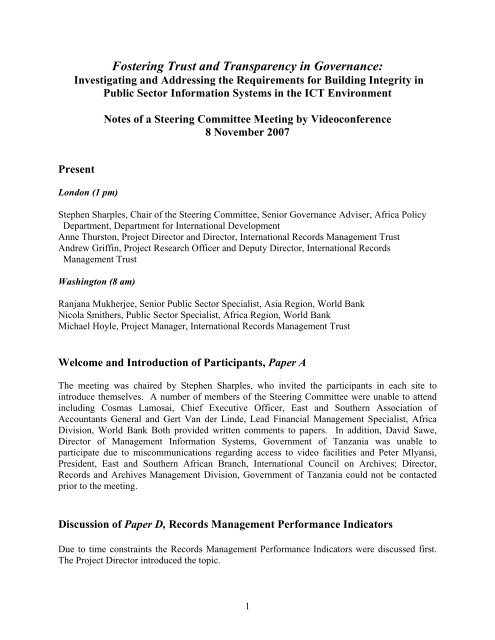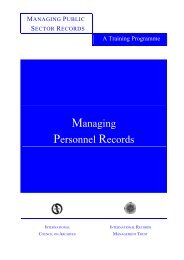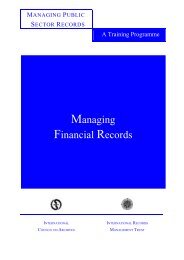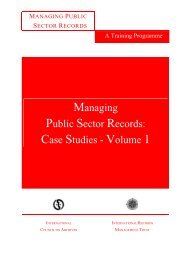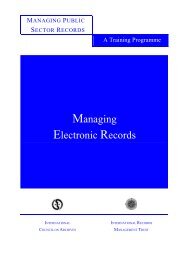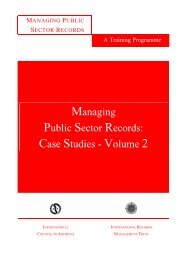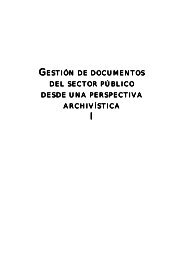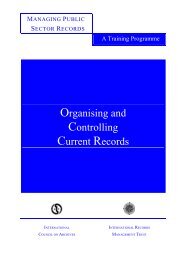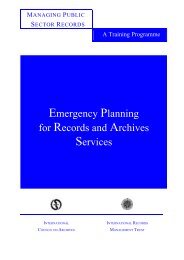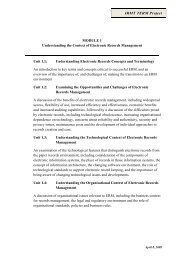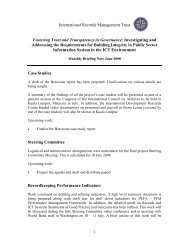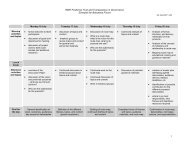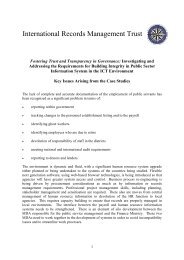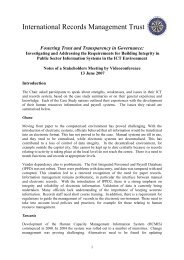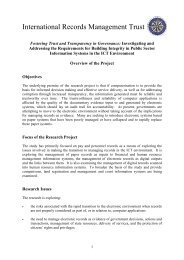Notes on Steering Committee meeting Nov 2007.pdf - International ...
Notes on Steering Committee meeting Nov 2007.pdf - International ...
Notes on Steering Committee meeting Nov 2007.pdf - International ...
You also want an ePaper? Increase the reach of your titles
YUMPU automatically turns print PDFs into web optimized ePapers that Google loves.
Fostering Trust and Transparency in Governance:<br />
Investigating and Addressing the Requirements for Building Integrity in<br />
Public Sector Informati<strong>on</strong> Systems in the ICT Envir<strong>on</strong>ment<br />
Present<br />
L<strong>on</strong>d<strong>on</strong> (1 pm)<br />
<str<strong>on</strong>g>Notes</str<strong>on</strong>g> of a <strong>Steering</strong> <strong>Committee</strong> Meeting by Videoc<strong>on</strong>ference<br />
8 <strong>Nov</strong>ember 2007<br />
Stephen Sharples, Chair of the <strong>Steering</strong> <strong>Committee</strong>, Senior Governance Adviser, Africa Policy<br />
Department, Department for Internati<strong>on</strong>al Development<br />
Anne Thurst<strong>on</strong>, Project Director and Director, Internati<strong>on</strong>al Records Management Trust<br />
Andrew Griffin, Project Research Officer and Deputy Director, Internati<strong>on</strong>al Records<br />
Management Trust<br />
Washingt<strong>on</strong> (8 am)<br />
Ranjana Mukherjee, Senior Public Sector Specialist, Asia Regi<strong>on</strong>, World Bank<br />
Nicola Smithers, Public Sector Specialist, Africa Regi<strong>on</strong>, World Bank<br />
Michael Hoyle, Project Manager, Internati<strong>on</strong>al Records Management Trust<br />
Welcome and Introducti<strong>on</strong> of Participants, Paper A<br />
The <strong>meeting</strong> was chaired by Stephen Sharples, who invited the participants in each site to<br />
introduce themselves. A number of members of the <strong>Steering</strong> <strong>Committee</strong> were unable to attend<br />
including Cosmas Lamosai, Chief Executive Officer, East and Southern Associati<strong>on</strong> of<br />
Accountants General and Gert Van der Linde, Lead Financial Management Specialist, Africa<br />
Divisi<strong>on</strong>, World Bank Both provided written comments to papers. In additi<strong>on</strong>, David Sawe,<br />
Director of Management Informati<strong>on</strong> Systems, Government of Tanzania was unable to<br />
participate due to miscommunicati<strong>on</strong>s regarding access to video facilities and Peter Mlyansi,<br />
President, East and Southern African Branch, Internati<strong>on</strong>al Council <strong>on</strong> Archives; Director,<br />
Records and Archives Management Divisi<strong>on</strong>, Government of Tanzania could not be c<strong>on</strong>tacted<br />
prior to the <strong>meeting</strong>.<br />
Discussi<strong>on</strong> of Paper D, Records Management Performance Indicators<br />
Due to time c<strong>on</strong>straints the Records Management Performance Indicators were discussed first.<br />
The Project Director introduced the topic.<br />
1
Key discussi<strong>on</strong> points included:<br />
• The Debt Management Improvement Indicators and Public Expenditure and<br />
Accountability (PEFA) Indicators were noted as examples. The Debt Management<br />
indicators provided a good example of a drill down assessment within the c<strong>on</strong>text of<br />
PEFA. It was suggested that a similar drill down model could be developed for pers<strong>on</strong>nel<br />
records.<br />
• There is also a need for a generic approach to records management indicators: a simple set<br />
of indicators that could be built into larger assessment processes and be aimed at the higher<br />
level for senior management. There should be four or five such indicators at most, linked<br />
to PEFA indicators. Whatever indicators were developed they should not be too ambitious<br />
in their scope particularly if they are to be brought into the main stream.<br />
• The small set of generic indicators could also be linked to the Government Anti Corrupti<strong>on</strong><br />
Acti<strong>on</strong>able Indicators (GATI) being developed by the World Bank. The Trust should get<br />
in touch with those resp<strong>on</strong>sible for this work. Feedback could be provided from a Sector<br />
Board <strong>meeting</strong> which was due to discuss GATI.<br />
• Indicators should be pitched at the output and outcome level. They should measure the<br />
operati<strong>on</strong>al performance of systems and how they are functi<strong>on</strong>ing <strong>on</strong> the ground. For<br />
example, the indicators should not assess the existence of a legal and organisati<strong>on</strong>al<br />
infrastructure but the performance <strong>on</strong>e would expect to see if the legal and organisati<strong>on</strong>al<br />
infrastructure was in place. It is important to avoid being prescriptive. There can be<br />
different infrastructure models with the same performance outcomes.<br />
• Records management needs to be seen as a key comp<strong>on</strong>ent of e-government and eservices.<br />
• Indicators should provide a snapshot of the records management situati<strong>on</strong>. They needed to<br />
be presented in a way that is understood and they must be useable by n<strong>on</strong>-specialist staff.<br />
• Motivati<strong>on</strong>s and possible outcome statements are important c<strong>on</strong>siderati<strong>on</strong>. For example, an<br />
indicator of whether employees can get informati<strong>on</strong> regarding their rights and entitlements<br />
would provide a motivati<strong>on</strong> for improvement.<br />
• While the indicators could be short and high level the guidance material could be more<br />
detailed.<br />
• To develop meaningful indicators c<strong>on</strong>siderati<strong>on</strong> could be given to what sort of things<br />
would <strong>on</strong>e expect to find regarding recordkeeping in any nati<strong>on</strong>. Examples would be<br />
particular outcomes of having a legal and organisati<strong>on</strong>al infrastructure for managing<br />
government records; placement of recordkeeping within government. The role of the<br />
nati<strong>on</strong>al archives and local records management professi<strong>on</strong> in achieving certain outcomes;<br />
and the existence and applicati<strong>on</strong> of retenti<strong>on</strong> rules for records.<br />
2
• Records management needs to be brought into the mainstream. It is hard to get an audience<br />
or to make officials focus <strong>on</strong> records management. Recordkeeping must be linked to the<br />
bigger picture. ‘Enforcing accountability/transparency through good records management’<br />
makes the link. It is essential to find new ways of articulating the linkage between records<br />
management and the bigger picture. The Project Director reported <strong>on</strong> her discussi<strong>on</strong>s with<br />
the Internati<strong>on</strong>al Development Research Centre (IDRC) in Ottawa and the proposals for<br />
work <strong>on</strong> the links between good governance, corrupti<strong>on</strong> and records.<br />
Discussi<strong>on</strong> of Paper B, Key Issues Arising from the Case Studies and<br />
Stakeholders’ Meeting<br />
Key discussi<strong>on</strong> points included:<br />
• Case studies must move bey<strong>on</strong>d the issues, many of which are obvious, and include<br />
recommendati<strong>on</strong>s and good practice guidance. Positive examples are needed as well as<br />
indicati<strong>on</strong>s as to what can go wr<strong>on</strong>g (disaster stories). ‘Do’s and d<strong>on</strong>’ts’ would be useful.<br />
There is a need to articulate the ‘end visi<strong>on</strong>.’ It was c<strong>on</strong>firmed that recommendati<strong>on</strong>s and<br />
good practice guidance would be discussed with regi<strong>on</strong>al stakeholders in a <strong>meeting</strong> in May<br />
2008.<br />
• In the IFMIS c<strong>on</strong>text the questi<strong>on</strong> remains to what extent IFMIS systems and their<br />
implementati<strong>on</strong> generally fall short of maintaining reliable audit trails (manual and or<br />
electr<strong>on</strong>ic). Do the c<strong>on</strong>clusi<strong>on</strong>s and findings <strong>on</strong> HRIS and payroll equally relate to IFMIS<br />
implementati<strong>on</strong>s as well? Which of the IFMIS supported and or created processes, records<br />
and results are most at risk? What has been d<strong>on</strong>e in some countries to mitigate against<br />
these risks?<br />
• Disaster recovery is a fundamental area when developing policies and plans for records<br />
management.<br />
• There should be integrated Audit Programmes developed to enable auditors to c<strong>on</strong>duct<br />
appropriate audits of the system. This alerts the need to involve the auditors in the<br />
trainings, etc. as <strong>on</strong>e of the main stakeholders.<br />
• Although there can be challenges with decentralisati<strong>on</strong> it can also lead to opportunities.<br />
Records in decentralised envir<strong>on</strong>ments are closer to people to whom they apply. Local<br />
government and district land issues in Bangladesh were discussed.<br />
The Project Director c<strong>on</strong>firmed that further case studies would be undertaken. Pers<strong>on</strong>nel and<br />
payroll systems in Sierra Le<strong>on</strong>e and Camero<strong>on</strong> are likely to be included. The possibility of case<br />
study using data from C<strong>on</strong>go was discussed. A study of office informati<strong>on</strong> systems in India was<br />
also under c<strong>on</strong>siderati<strong>on</strong>, to be undertaken through the Nati<strong>on</strong>al Informatics Centre (NIC) in<br />
Delhi. If a further study is to be undertaken in India, it was suggested that the Trust needs to be<br />
certain what it was trying to achieve. For example, can the NIC learn from us? Further research<br />
<strong>on</strong> the land registrati<strong>on</strong> system Bhoomi should not be undertaken as it had already been<br />
3
extensively studied. Working in South Asia is difficult at present due to the political situati<strong>on</strong>s in<br />
Pakistan and Bangladesh and the lack of records in Afghanistan. Foreign d<strong>on</strong>ors were also seen<br />
as needless intrusi<strong>on</strong>.<br />
Discussi<strong>on</strong> of Paper C, Educators’ Forum and the Development of the<br />
Guidance Material, Training Modules and Route Map<br />
The Project Director introduced the paper. A larger number of modules than originally planned<br />
were being developed. These would be shorter and their use would be flexible. The Guidance<br />
Material would be aimed at a higher level.<br />
Key discussi<strong>on</strong> points included:<br />
• The issue of the audience for the guidance material and modules was raised. Participants<br />
at the planning sessi<strong>on</strong> for the training and guidance materials had spent some time <strong>on</strong> this<br />
issue. There is a need to get the right balance and that further work is required <strong>on</strong> getting a<br />
good level for the guidance material.<br />
• The possibility of a 12th module <strong>on</strong> IFMIS was raised. Clearly there is a link to the current<br />
work <strong>on</strong> Human Resource Informati<strong>on</strong> Systems and pers<strong>on</strong>nel and payroll records.<br />
Discussi<strong>on</strong> of Paper E, Plans for Remaining Activities<br />
The Project Manager outlined the paper. It is essential to link the planned Nati<strong>on</strong>al Workshops to<br />
other activities in the regi<strong>on</strong>, for example workshops being run by the IMF AFRITAC, SADC<br />
and anti corrupti<strong>on</strong> commissi<strong>on</strong>s. Without this link the audience for the workshops will be<br />
limited. The Trust is urged to look at other activities <strong>on</strong> accountability and good governance and<br />
determine whether it was possible to be part of these, thereby achieving higher visibility.<br />
Date of Next Meeting<br />
The next and final <strong>meeting</strong> was tentatively set for June or July 2008 following the development<br />
of the training and guidance materials and the May Regi<strong>on</strong>al Stakeholders <strong>meeting</strong>.<br />
4


